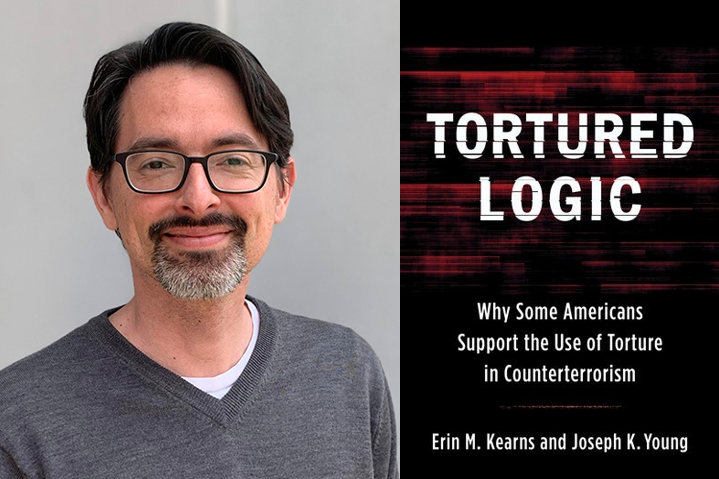In this interview, Joe Young talks about his new book, Tortured Logic: Why Some Americans Support the Use of Torture in Counterterrorism, which he co-authored by Erin M. Kearns. A Professor of in the School of Public Affairs and School of International Service at American University, Joe talks about why some people support torture, why and when they change their minds, and why it’s still used by the US government, despite expert consensus that it’s ineffective.
Your new book with Erin M. Kearns, Tortured Logic: Why Some Americans Support the Use of Torture in Counterterrorism, was recently published by Columbia University Press. Why do people support torture?
People support torture as a response to a threat that they see as violent. It’s a base, almost unconscious response. Some people are fixed in those beliefs—they are always in favor of torture—and others may change their views depending on the cues they are given. This was something we tested in our experiments. Interestingly, Democrats tend to be more fixed in their beliefs—and Democrats tend not to support torture—and Republicans tend to be a little bit more fluid, but Republicans tend to support torture more.
Do people support torture because they think that the person being tortured is guilty of something and so it’s fair to punish them? Or is it because they think torture is an effective way to protect themselves from something bad happening?
Both. It’s part they feel the detainee is guilty, and also that people are more willing to punish certain groups. In one of our experiments, we vary the identity of the person under interrogation, and we find that Americans are less supportive of torturing someone if they are from the US or the UK, or even China. But if we asked about torturing someone who is Middle Eastern, there was more support for torturing them.
Most of the torture you see in the media is about information gathering. It’s the ticking time bomb scenario. People are way more in favor of torture when you put it in terms of: “this guy has got some information that can help us stop this bomb from going off.”
The problem with that narrative is that it never actually happens in practice. That’s the thing that interrogators and torture experts told us. Most of the time, no one piece of information is going to mean the difference between life and death. Think about the information that helped the US find Osama bin Laden. They interrogated detainees about him hundreds of times, waterboarded them. But the information that ultimately helped them find him was just normal conversation and through tracking his courier. That’s what all the interrogators told us: you build a rapport, keep them talking, let them feel comfortable.
How prevalent is torture and who uses it?
Darius Rejali, in his book about torture and democracy, claims that torture is pretty much ubiquitous—democracies do it, autocracies do it. But the tactics countries use vary. Democracies tend to prefer what he calls “torture light,” or what they believe is non-scarring torture—sleep deprivation, exposure to cold, etc. Most of our research suggests, though, that this kind of torture isn’t any easier on people or less painful for them emotionally.
In the US, there were periods where we’ve done less and more of it. Post-World War II, there was a real sense that torture was not something that the US does. After 9/11, it became a tool again that people thought should be used against our adversaries.
What surprised you as you got deeper into the topic?
I thought that abstractions from reality—torture shown on TV shows and in the movies, for example—wouldn’t really affect people. I was surprised at how small manipulations on television, for example, did influence people. My co-author Erin Kearns, has an article on this called Wait, They Tortured in Zootopia? She and a co-author looked at torture in kids shows and movies and it’s super common. It’s just amazing how prevalent it is in our society and in our media, and it has a big impact on people’s viewpoints on whether we should or should not use torture as a policy.
The malleability of people’s opinions about torture was surprising to me.
The debates and dilemmas arise if people think torture is potentially effective, even if it’s viewed as immoral. When you talk to the experts about this, everybody says it’s immoral. The bigger issue is: is it effective or not? When you say it’s effective, people switch their views on it. That’s why the media is so powerful. If you show Jack Bauer in TV’s 24 extracting something from a detainee, people go: “see, it works.” That sounds crazy right? But former Supreme Court Justice Antonin Scalia cited Bauer as an example of the effectiveness of torture.
That’s insane. I blame Keifer Sutherland.
He felt bad about it, I think. I read a couple of interviews with him and the producers of 24. Members of the army came to the producers and said: “Quit showing torture working. It is having a detrimental effect on troops in the field.” And the producers listened and tried to moderate a little bit. But our experiments and the results we show suggest that showing torture—whether you show it working or not—stimulates that same violent response from people. So, you’ve already done damage just by showing it.
Does torture work?
In the book we interview a bunch of interrogators and we tried to find folks who would make a pro-torture argument on the record. But all the interrogators we spoke to couldn’t and wouldn’t. They all uniformly agree that it doesn’t work and that it’s not a useful thing to do.
If all the experts agree that torture doesn’t work, why do we still have it as a policy option in our country?
I think the answer to this is that the pro-torture narrative is easier to digest. People may not like being associated with torture but they feel sometimes that you need to break an egg to make an omelette. It is a harder sell that torture has a long-term effect on the reputation of a country, has backlash effects and is not effective contra to all the media that people watch suggests.
What was one of your most interesting interviews?
We were lucky that so many folks graciously agreed to chat with us on the record. All of them were interesting, but our interview with Mark Fallon stood out. He was the director of the Criminal Investigative Task Force at the US Military’s Guantanamo detention camp for two and half years, where his organization conducted a parallel and independent series of interrogations and intelligence analysis from those conducted by the CIA and the FBI. I can’t think of too many people who have more deep insight into how interrogations work and why torture doesn’t. He told us fascinating stories and persuaded us given his experiences and insights.
You’re a political scientist and Erin is a criminologist. How do you guys think about this topic differently?
I don’t self-identify as a political scientist—I’m much more interdisciplinary—but I do see power everywhere. I can see why people would want to have this tool. When Obama came to power, he didn’t stop all the programs that Bush started. He said, “wait, that gives me a lot of wiggle room and I can use drones and I can detain people indefinitely and never tell anyone about it.” Erin, who has undergraduate and graduate degrees in psychology, is a bit more focused on the specific actions of interrogation and how that affects the detained. She was the driving force in trying to understand people’s views on torture using experiments from psychology and elsewhere.
What do we still not know about torture that you wish that we understood?
In the middle of writing the book, the Senate released its torture report. We figured that the saliency of torture would moderate people’s views. We got indeterminate results; it wasn’t as powerful as we thought it might be. I still believe at my core that these major focusing events have a big impact on people’s views. If we had been able to, say, look at people’s opinions before and after Abu Ghraib, or before and after 9/11, I think we would have seen big changes
If there was one thing that you could tell American leaders about torture, what would you tell them? And what would you tell American citizens?
If I were advising campaigns I might help increase awareness that there’s going to be times when candidates can manipulate public opinion in favor of torture because of what’s going on. I would tell American citizens that it just doesn’t work. You may think that it’s a useful tool, but it isn’t. Let’s focus on policy and tools that actually make Americans safer.
Joseph K. Young is a professor at American University with a joint appointment in the School of Public Affairs and the School of International Service. Erin M. Kearns is an assistant professor in the Department of Criminology and Criminal Justice at the University of Alabama.







